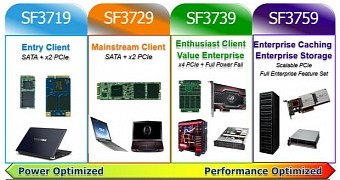Currently, the best controller chips found in SATA solid state drives can't enable a performance much higher than 555 MB/s, even when they really try, and it seems like we'll have to endure this state of affairs for a while still.
Admittedly, 500-600 MB/s is a lot, but it pales in comparison to the performance that can be attained over PCI Express, and more recently, M.2.
Of course, ultra M.2 slots also use the PCI Express root complex to enable high performance, so it's the same technology in the end.
Digression aside, though, solid state drives really need to maintain their performance advantage over HDDs, especially now that SATA 12 Gbps interfaces are beginning to crop up.
That's why so many people are counting on the upcoming SandForce SF-3000 series of SSD controller chips, and why those same people will have to live with a bit of disappointment.
According to at least one report, the SF-3000 series of chips will be delayed, because SandForce (now owned by Seagate) won't have them ready before 2015.
What the problems are with the SandForce chips
The company name became pretty famous a few years ago for having the best SSD controllers on the market. In 2011, the company was bought by LSI, but eventually, Seagate bought LSI in turn. That was in June this year.
Most of the chips they made have been used in SATA storage devices, but PCI Express SSDs have used them extensively as well.
Apparently, that's where the problem lies at the moment. The PCI Express devices expected to use SF-3000 are proving problematic. It's not clear if it's a hardware chip issue or if the firmware has to be modified.
Either way, the SF-3000 product family will be late to the party. Although seeing as how there aren't any real rivals for it, it doesn't stand to lose much.
The general specs of SandForce SF-3000 chips
They are compatible with PCI Express 2.0 x4 performance standards, which is why they can allow SSDs to reach 1,800 MB/s and 150,000 / 81,000 read/write IOPS (input-output operations per second) over that standard.
When SATA 12 Gbps, SAS 12 Gbps and USB 3.1 become more prevalent, the SandForce controllers will no doubt spread their reach even wider. Looked at it like that, the delay to next year won't pose many drawbacks, financially, to Seagate.
That it will kind of kill people's dreams of super-fast SSDs for Christmas is something each person has to deal with we suppose.

 14 DAY TRIAL //
14 DAY TRIAL //